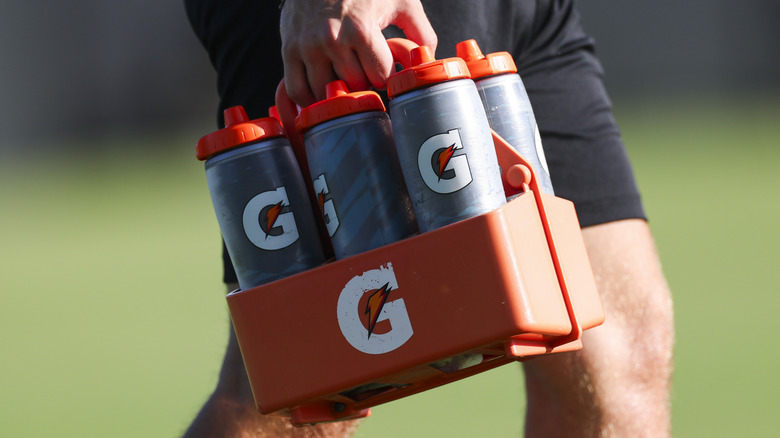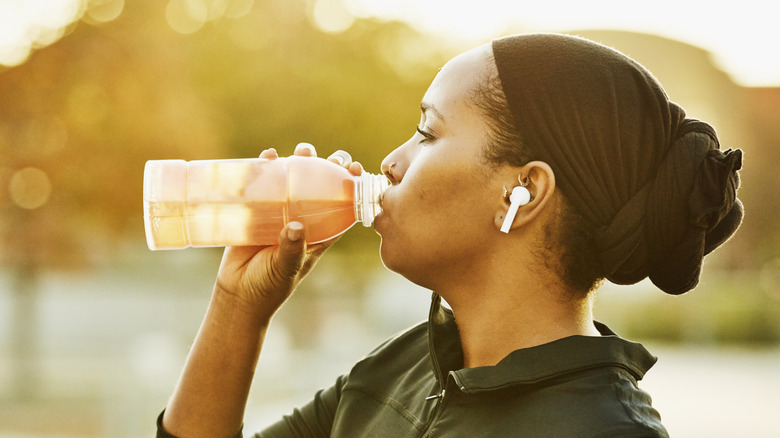Joe Biden's Daily Diet Includes A Popular Hydrating Drink That Has A Major Downside
Now that former President Joe Biden is no longer in the White House, he's spending part of his retirement getting treatment for aggressive prostate cancer and making plans for his presidential library. While he was in office, Biden was often spotted at ice cream shops around the country. In fact, Fox 5 in Washington recently caught him visiting two different ice cream spots in Maryland within the same week.
According to Axios, Biden isn't exactly known for clean eating–much like his predecessor and successor, Donald Trump (here's what Donald Trump eats in a day). Some of Biden's go-to favorites include peanut butter and jelly sandwiches, pizza, and BLTs. Also like Trump, Biden doesn't smoke or drink alcohol. But unlike Trump, he's not downing a dozen Diet Cokes a day. Instead, he prefers Gatorade.
Gatorade is a sports drink meant to fuel tough workouts. It's packed with electrolytes that help keep you hydrated and prevent cramping. But what gives Gatorade that energy boost is also what makes it less than ideal as an everyday drink: added sugar. A 12-ounce bottle of Gatorade has 21 grams of added sugar. So unless you're working out, Gatorade might not be the healthiest thing to sip on.
Why Gatorade's added sugar and sodium are meant for athletic performance
Gatorade gets its name from researchers at the University of Florida, who observed that their football players were losing electrolytes and blood sugar during games. To address this, the researchers tested various combinations of sugar and electrolytes to find a formula that could replenish nutrients and improve performance without the sugar upsetting the players' stomachs. In other words, the sugar is meant to fuel athletic performance, and the extra sodium helps prevent dehydration.
While in office, President Biden worked out at least five days a week, though he may have had to give up his Peloton due to security concerns. Still, he regularly hit the weight room in the morning, often while watching the news, according to the Washington Post. Sipping on a bottle of Gatorade during these sessions may have helped him power through longer or more intense workouts, but a sports drink isn't exactly meant for White House meetings, no matter how long or intense they get.
The added sugar in Gatorade can contribute to health problems like obesity, type 2 diabetes, and heart disease. The Dietary Guidelines for Americans recommend limiting added sugars to no more than 10% of your daily calories. For someone on a 2,000-calorie diet, that's just 50 grams of added sugar, or roughly the amount in a 32-ounce bottle of Gatorade. That same bottle also contains 387 milligrams of sodium. To manage blood pressure, the American Heart Association recommends capping daily sodium intake at 2,300 milligrams.
Not all sports drink hydrate you effectively
Although Gatorade has been used by athletes around the world for decades, sports hydration has evolved a lot since the 1960s. The brand now offers far more than its original lemon flavor. These days you'll find multiple flavors, plus lower-sugar and zero-sugar options, all while keeping the electrolyte balance relatively consistent. Still, not all sports drinks are created equal, and some work better for sports hydration than others (here are some signs of dehydration).
The original Gatorade is considered isotonic, meaning it has a similar concentration of sugars and salts as your blood. Some sports drink varieties, like Gatorade G2, are hypotonic, with lower sugar and salt levels than your blood. According to a 2022 systematic review in Sports Medicine, hypotonic sports drinks are the most effective for maintaining hydration because they're absorbed into the bloodstream more quickly. Drinks with high amounts of sugar or carbohydrates can actually slow hydration and cause some issues in your gut.


